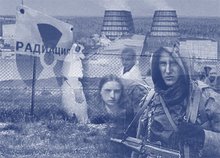Over the past several years, the International Atomic Energy Agency (IAEA) has been working on a definition of “nuclear security culture” so that it can be used as a tool to improve the physical protection of nuclear materials and facilities.
Indeed, a 2001 IAEA report titled “Fundamental Principles of Physical Protection of Nuclear Materials and Nuclear Facilities” identified security culture as one of the twelve principles underlying fissile-material security.
In February 2005, at their summit in Bratislava, President Bush and President Putin vowed to step up joint efforts to bolster security culture, pairing disciplined, well-trained, responsible custodians and protective forces with well-maintained security systems.
In July 2005, a series of amendments to the Physical Protection Convention was approved elevating the status of security culture to that of a treaty obligation. In October 2005, a NATO Advanced Research Workshop held in Moscow, Russia gathered over 90 international experts, attempting to build a consensus on the concept and definition of nuclear security culture by sharing national best practices in the management of fissile materials.
This website is designed to serve both as a resource and a forum for nuclear managers, policy-makers and researchers worldwide with the idea of contunuing the dialogue and discussion on nuclear security culture. Our main objective is to support and augment the ongoing IAEA activity by identifying existing trends, perceptions and approaches.
Indeed, a 2001 IAEA report titled “Fundamental Principles of Physical Protection of Nuclear Materials and Nuclear Facilities” identified security culture as one of the twelve principles underlying fissile-material security.
In February 2005, at their summit in Bratislava, President Bush and President Putin vowed to step up joint efforts to bolster security culture, pairing disciplined, well-trained, responsible custodians and protective forces with well-maintained security systems.
In July 2005, a series of amendments to the Physical Protection Convention was approved elevating the status of security culture to that of a treaty obligation. In October 2005, a NATO Advanced Research Workshop held in Moscow, Russia gathered over 90 international experts, attempting to build a consensus on the concept and definition of nuclear security culture by sharing national best practices in the management of fissile materials.
This website is designed to serve both as a resource and a forum for nuclear managers, policy-makers and researchers worldwide with the idea of contunuing the dialogue and discussion on nuclear security culture. Our main objective is to support and augment the ongoing IAEA activity by identifying existing trends, perceptions and approaches.

No comments:
Post a Comment